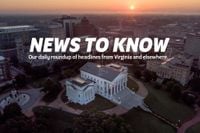Democrat James Walkinshaw’s decisive victory in Virginia’s 11th Congressional District special election on September 9, 2025, is sending ripples through Washington and beyond. The win, which returned a solidly blue seat to Democratic hands following the death of longtime Rep. Gerry Connolly, has become emblematic of a broader trend: Democrats are not just holding their ground in special elections this year—they’re consistently outperforming expectations.
The Associated Press called the race in Walkinshaw’s favor at 7:36 p.m., just 36 minutes after polls closed, with the Democrat securing roughly 75% of the vote compared to Republican Stewart Whitson’s 25% (Virginia Mercury, Associated Press). The margin—a full 50 points—was striking even in a district Kamala Harris carried by 34 points in the 2024 presidential election (CNN). Walkinshaw’s win marked a 16-point over-performance for Democrats, echoing a pattern of strong showings in special and off-year elections across the country.
Walkinshaw, who served as Connolly’s chief of staff and as a Fairfax County Board of Supervisors member, was sworn into Congress by House Speaker Mike Johnson (R-La.) at 4:20 p.m. the day after the election. In his first remarks on the House floor, Walkinshaw declared, “On day one, I am ready to stand up for Fairfax. From taking on DOGE to defending our democracy, I will fight every single day to deliver results for the people of the 11th District.”
The special election was triggered by the death of Rep. Gerry Connolly in May 2025, following his battle with esophageal cancer. Connolly, a fixture in Northern Virginia politics since 2008, endorsed Walkinshaw as his successor shortly before passing. Walkinshaw’s campaign, buoyed by Connolly’s support, focused on a broad set of progressive priorities—banning assault-style weapons, expanding federal nondiscrimination protections, protecting victims of sexual assault, and eliminating partisan gerrymandering. He also highlighted his support for affordable housing and environmental initiatives, such as replacing gas-powered leaf blowers with electric ones in Fairfax County.
Republican Stewart Whitson, an Army combat veteran, former FBI special agent, and senior official at a conservative think tank, faced an uphill battle from the start. His campaign, centered on public safety, school choice, and economic opportunity for federal employees, was outmatched financially—Walkinshaw raised about $1.1 million, including a $1 million boost from the crypto lobbying group Protect Progress, compared to Whitson’s $225,000 (Axios, Federal Election Commission filings). On election night, Whitson conceded graciously, stating, “While tonight’s outcome was not what we hoped for, I could not be more proud of the campaign we ran and the movement we built together. I congratulate my opponent and extend my gratitude to every voter who participated in this important election. Democracy is strongest when we all engage, and I am humbled by those who placed their trust in me.”
For Walkinshaw, the campaign was personal and political. He described the election as “our first chance to send a Democrat to Congress since Trump took office again,” positioning himself as a bulwark against what he called “the most corrupt” administration in American history. The district’s proximity to Washington, D.C., meant federal issues loomed large—Walkinshaw denounced President Trump’s cuts to the federal workforce and the deployment of National Guard troops to the capital, and he promised to champion local interests in Congress.
Beyond the local implications, the outcome in Virginia’s 11th is being closely watched as a bellwether for national political trends. According to Politico, Democrats’ win in this special election added one more vote to their ranks in Congress, narrowing the Republican majority in the House to six seats. While the result does not change overall control—Republicans still hold a 219-212 margin—it further lowers the threshold for passing legislation and signals potential vulnerabilities for the GOP heading into the 2026 midterms.
Analysts have noted that Democrats are over-performing in special elections by an average of more than 18 points in 2025, the highest margin seen in the Trump era (CNN, University of Virginia Center for Politics). This is not an isolated phenomenon: Democrats have flipped two Iowa state Senate districts and a Pennsylvania state Senate district that Trump had previously won by double digits this year. Even in state-level races, Democratic candidates have consistently outpaced the party’s 2024 margins. In April, for example, a Democratic-backed candidate in Wisconsin’s high-profile Supreme Court race over-performed by 11 points, and in March, Democrats flipped a Pennsylvania state Senate seat that had gone for Trump by 15 points.
What’s driving these over-performances? Political observers point to shifting coalitions and voter motivation. Special elections typically see lower turnout, which can produce bigger swings, but the consistency of Democratic gains suggests deeper undercurrents. Some Republican strategists worry that the GOP’s base is increasingly comprised of irregular and less-engaged voters—a challenge when Trump is not on the ballot to boost turnout, as will be the case in the 2026 midterms. Polls conducted in late July found that as many as 3 in 10 Republican voters expressed concerns about Trump’s second term, from tariffs to foreign policy to the handling of high-profile issues like the Epstein files (CNN).
The significance of these special election results is not lost on party leaders. The Trump administration earlier this year scrapped its nomination of New York Rep. Elise Stefanik for United Nations ambassador, reportedly due in part to concerns about losing her district in a special election—even though it had favored Trump by 21 points in 2024. And the reaction from prominent MAGA voices has been telling. Scott Presler, a key figure in GOP voter turnout efforts, warned on X (formerly Twitter) after Walkinshaw’s win, “Y’all are going to lose 2026, & it’s going to be bad.”
Of course, as many analysts caution, special and off-year election results are not always predictive of future outcomes. Democrats performed well in special elections in 2024 but ultimately lost the presidential race. Still, the scale and consistency of their over-performance this year—averaging nearly 16 points across all types of special elections, according to The Downballot—have injected fresh energy into the party and raised alarms among Republicans.
For now, Walkinshaw’s victory stands as both a tribute to his late mentor and a sign of shifting political winds in the Trump era. In his words, “The voters of Fairfax have spoken clearly: they want a representative who will fight for our community and deliver results. I am humbled by the confidence they have placed in me, and I will work tirelessly to make life more affordable for families, protect our freedoms, and ensure that the 11th district has a strong voice in Congress.”
As the dust settles in Northern Virginia, both parties are sure to study the results closely—searching for clues about what lies ahead in 2026 and beyond.





